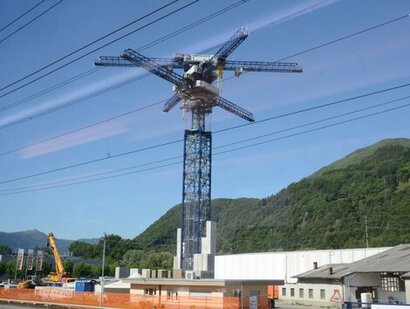
It includes one of the largest listed engineering, procurement and construction (EPC) companies in the region, WBHO, which will support all EPC activities, as well as pan-African project engineering group iX Engineers and commercial developer Sizana Solutions, which has been partnered with Energy Vault since 2019 in development of the South African market for energy storage solutions.
While the scope of the license and royalty agreement includes Energy Vault’s gravity energy storage systems (GESS) and its associated VaultOS energy management system (EMS), the consortium companies are also bidding Energy Vault’s leading portfolio of short duration battery and ultra-long duration Green Hydrogen hybrid systems within the SADC territory to address energy shifting and micro-grid development to serve the utility, mining and industrial sectors.
The multi-year agreement is expected to facilitate multi-gigawatt hours (GWh’s) of long duration Energy Vault GESS deployments to contribute to the SADC region’s energy storage needs, estimated to reach over 125 GWh by 2035. In addition to the technology licensing revenue, Energy Vault will receive a project revenue royalty over the complete operating life of each project, including software and maintenance revenues.
Under the terms of the agreement, GESSOL will have exclusive rights to deploy Energy Vault’s portfolio of gravity energy storage technology and VaultOS throughout the SADC region, a 16 member-state regional economic community with a mission to promote sustainable and equitable economic growth and socio-economic development. SADC’s member states are comprised of: Angola, Botswana, Comoros, Democratic Republic of Congo, Eswatini, Lesotho, Madagascar, Malawi, Mauritius, Mozambique, Namibia, Seychelles, South Africa, United Republic Tanzania, Zambia and Zimbabwe.
“We conducted extensive due diligence to bring the most economical, efficient, flexible and sustainable long duration energy storage solution to the SADC region and Energy Vault’s gravity storage technology is the clear choice” said Les Lange, Director, GESSOL. “Southern Africa is a rapidly developing region with increasing energy demand, which historically has been met with coal-fired plants. Economic development in the SADC region is critical for improving quality of life, but we need to rapidly wean the region off of coal to simultaneously reduce carbon emissions and grow our economy. Energy storage is critical for the scale up of clean, baseload renewable energy in the SADC region and we are confident that with Energy Vault’s GESS and energy management software, as well as its broader energy storage portfolio that can address both shorter and ultra-long duration, we can achieve this objective.”
The Energy Vault-GESSOL agreement brings together a coalition of world-class EPC and Project Engineering firms who will partner on Energy Vault GESS project deployment, including WBHO, one of the largest civil construction EPC contractors in the SADC region, and iX Engineers, one of the largest pan-African engineering design and consulting firms in the SADC region.
“Given the significant pan-African potential of Energy Vault’s unique gravity storage systems, we’re excited to play a leading role in bringing the deployments covered by the Energy Vault-GESSOL agreement to life” added Russell Adams, Director, Projects Division, WBHO. “With our license partners and our significant local skills base and supply chain, as an EPC contractor in Southern Africa, we’re very much looking forward to bringing our experience and expertise to bear so that deployment of Energy Vault’s technology, which incorporates substantial local content, can contribute to the energy transition in the region as it works to quickly accelerate its decarbonisation efforts.”
According to the SADC, an electricity shortage has strained the region since 2007, where only 50 percent of residents have access to electricity and only 32 percent of rural areas in the region have access, while North Africa countries have reached 100 percent access to electricity. In addition, coal currently supplies 62 percent of power generation in Southern Africa. We believe that Energy Vaults’ gravity technology and portfolio of other electrochemical and green hydrogen micro-grid solutions can contribute to the acceleration of the region’s clean energy transition timelines.
According to a 2023 report by the International Institute for Sustainable Development, South Africa’s power system has fallen into crisis, and the national electricity utility, Eskom, can no longer provide sufficient supply to balance with demand. In response, frequent scheduled power cuts (commonly known as load shedding) have become more prevalent and 2023 was the worst year on record for load shedding. The report notes that to address the electricity supply shortfall, grid storage can contribute to optimising the use of existing power generation and maximising the use of the existing grid.
Energy Vault’s expansion into Southern Africa represents the company’s strong global momentum with its gravity energy storage portfolio into another large and growing energy storage market. The company recently announced five additional EVx GESS deployments of 3.3GWh in China, the largest energy storage market in the world, where Energy Vault put in place similar license and royalty model announced in early 2022.
The process for state grid interconnection commenced in September 2023 for the first EVx system which is under final commissioning in Rudong with all power infrastructure in place and with the state grid now powering the system directly. We expect the Rudong EVx system (25 MW, 100 MWh, +35 years technical life) to be the world’s first commercial, grid-scale gravity energy storage system to offer a more sustainable and flexible alternative to historical long technical life energy storage assets such as pumped hydro plants, which still represent over 90 percent+ of all energy storage globally. The company also expects that the projects recently announced with China Tianying, Energy Vault’s partner in China, will bring the total number of EVx deployments in that market to seven, totaling 3.3 GWh, or $1+ billion in project scope.
For additional information:

